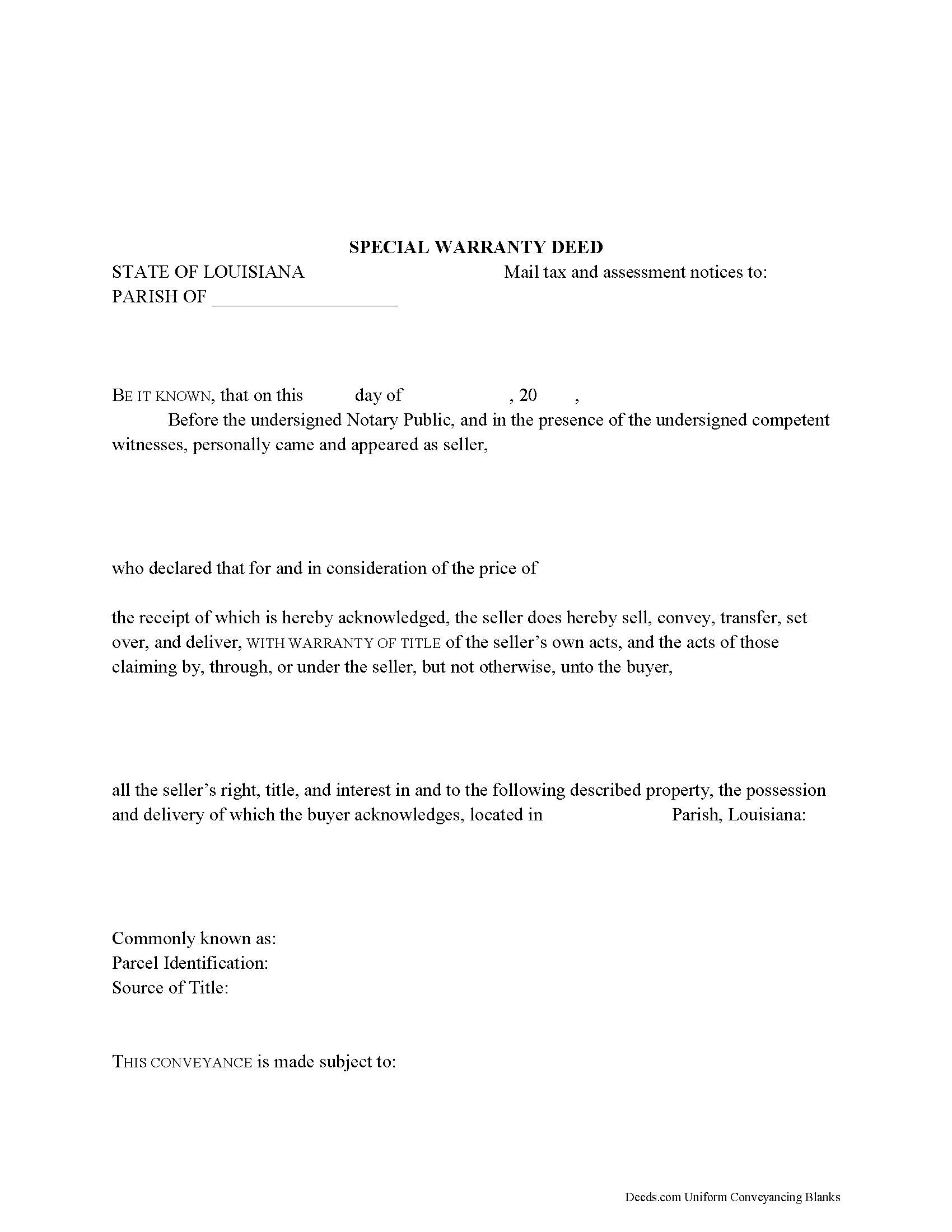Louisiana Warranty Deed
Parish Forms
Where is the property located?
Acadia ParishAllen ParishAscension ParishAssumption ParishAvoyelles ParishBeauregard ParishBienville ParishBossier ParishCaddo ParishCalcasieu ParishCaldwell ParishCameron ParishCatahoula ParishClaiborne ParishConcordia ParishDe Soto ParishEast Baton Rouge ParishEast Carroll ParishEast Feliciana ParishEvangeline ParishFranklin ParishGrant ParishIberia ParishIberville ParishJackson ParishJefferson ParishJefferson Davis ParishLa Salle ParishLafayette ParishLafourche ParishLincoln ParishLivingston ParishMadison ParishMorehouse ParishNatchitoches ParishOrleans ParishOuachita ParishPlaquemines ParishPointe Coupee ParishRapides ParishRed River ParishRichland ParishSabine ParishSaint Bernard ParishSaint Charles ParishSaint Helena ParishSaint James ParishSaint Landry ParishSaint Martin ParishSaint Mary ParishSaint Tammany ParishSt John The Baptist ParishTangipahoa ParishTensas ParishTerrebonne ParishUnion ParishVermilion ParishVernon ParishWashington ParishWebster ParishWest Baton Rouge ParishWest Carroll ParishWest Feliciana ParishWinn ParishWarranty Deed for Real Estate Located in Louisiana

A warranty deed is a customary form for the conveyance of real estate in Louisiana. Deeds in this state may be referred to as Acts of Sales or Cash Sales. The Louisiana Statutes do not provide a statutory form for a warranty deed.
In Louisiana, the warranty for condition is referred to as redhibition. Redhibition is a civil action against the seller of a defective product or property, similar to lemon laws in other states. In a warranty deed, the grantor warrants the buyer against redhibitory defects or vices in the property. A redhibitory defect is defined as a defect that renders the property useless, or its use would be so inconvenient that it is presumed that the buyer would not have purchased the real estate had he known about the defects (CC 2520). In addition, the grantor also warrants to the buyer the ownership and peaceful possession of the property, and the absence of hidden defects. The seller also warrants that the property being sold is fit for its intended use (CC 2475). In Louisiana, a seller of real estate who is in good faith is allowed to limit the warranties made in regard to redhibitory defects by including a waiver of redhibition clause in the deed.
The grantor to a warranty deed must sign the instrument and have his or her signature acknowledged. Some recording clerks will require the signature to be in authentic form, which although not a statutory requirement is nonetheless a common practice in Louisiana. An instrument in authentic form requires the signature of each party who executed the instrument. A warranty deed may be acknowledged in Louisiana or out-of-state. If executed out of state, a warranty deed will have the same force and effect as if executed by or before a notary public in Louisiana (RS 35:5).
There are three different types of written instruments in Louisiana: the authentic act, the act under private signature duly acknowledged, and the act under private signature or writing. The authentic act is used for most warranty deeds and recorded documents. An authentic act is executed in writing before a notary public, in the presence of two witnesses, and signed by each party who executed the warranty deed or other instrument. Both the witnesses and notary public must sign. The act under private signature duly acknowledged is a written instrument signed before a notary public. The presence of witnesses is not required for the signing of this type of document; however, witnesses need to be present when the notary signs. The act under private signature is not used often.
Real estate deeds or Acts of Sale are recorded in the parish at the clerk of courts office in the parish where the real property (immovable) is located. The ownership of real property is voluntarily transferred by a deed (contract) between the owner and the transferee that purports to transfer the ownership of the property. The transfer of ownership takes place between the parties by the effect of the agreement and is not effective against third persons until the warranty deed (or Act of Sale) is filed for registry in the conveyance records of the parish where the real property is located (CC 517). This type of recording act is known as a race statute. Priority of documents is determined by the order of filing.
(Louisiana WD Package includes form, guidelines, and completed example)